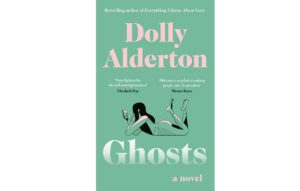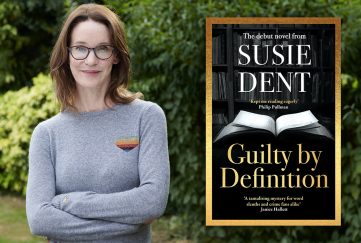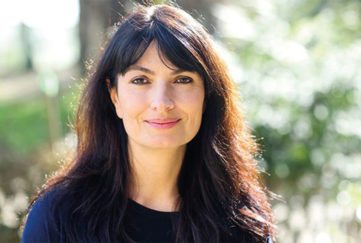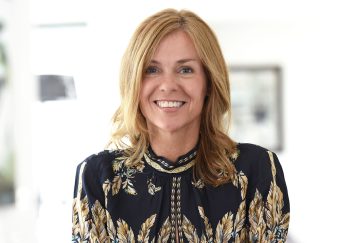A Conversation with Dolly Alderton, author of Ghosts
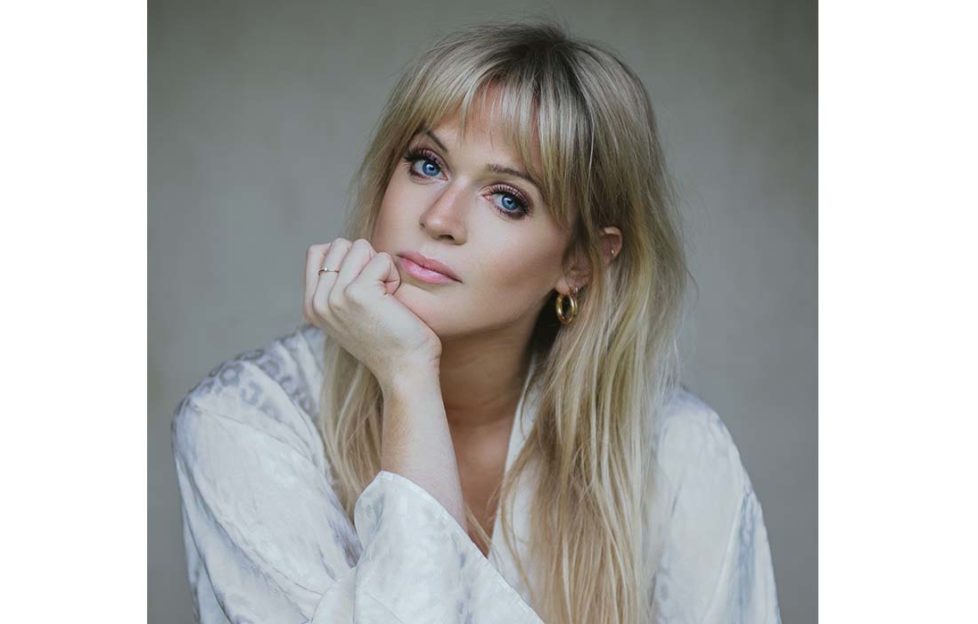
By Claire Gill
With her first ever work of fiction Ghosts hitting the shelves, MW Fiction Editor Claire caught up with the writing whirlwind that is Dolly Alderton…
Dolly Alderton has never been one to sit still. Author, journalist and podcast host she started her career as a freelance journalist, writing columns, features and interviews for national media. Honest with a gigantic H, Dolly went on to pen her life in the bestselling memoir Everything I Know About Love. Current affairs and pop culture podcast with bestie Pandora Sykes came next, with a download audience of 1.2 million… If you’re not exhausted reading her list of accomplishments, there’s more to come.
You’ve left non-fiction where you bared all in a literary sense, finally shutting the gate on your private life. Now you’ve arrived at the slower paced, less intrusive door of fiction. How does it feel?
It feels like a great new adventure. A real privilege and a very different activity to all the writing that I have done in my life so far. More creative, less raw, safer. I’m only one novel in but I am really enjoying it. I’ve loved the experience.
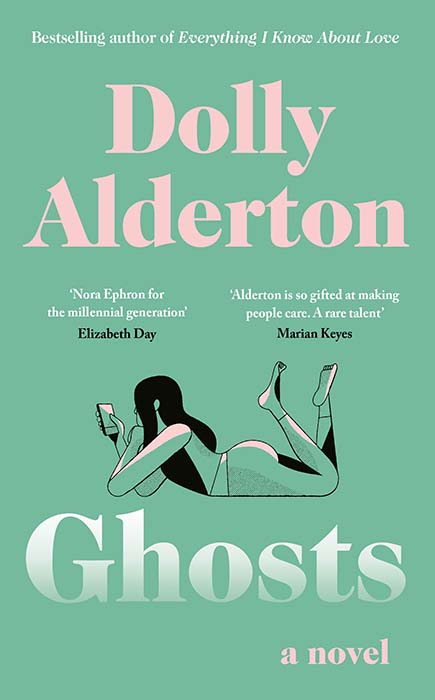 Your Debut novel Ghosts is a novel of grown up cynicism, a tale of modern love, relationships and friendships. It features Nina, a successful food writer, single and in her early 30s. There are many themes, from ageing, dementia, identity, friendships, family, love personified as ghosts. And everyone close to Nina is changing. Where has this inspiration come from?
Your Debut novel Ghosts is a novel of grown up cynicism, a tale of modern love, relationships and friendships. It features Nina, a successful food writer, single and in her early 30s. There are many themes, from ageing, dementia, identity, friendships, family, love personified as ghosts. And everyone close to Nina is changing. Where has this inspiration come from?
In terms of Nina and her story, she is quite a different character to me. From her friendships, love life, to her parents, they are all very different to mine. But I am using her and her fictional world to explore anecdotes, experiences and questions that have been simmering in my head since I first wrote my memoir Everything I Know About Love back in 2018. The difference between a 28-year-old and a 32-year-old is immense.
Let’s first touch on the obvious theme of ‘ghosting’, the act of ignoring someone, when Nina the main character was ghosted by her date. Is this a modern British phenomenon do you think?
That’s such a fascinating question and I can’t believe it’s not one I’ve thought about before, about how Ghosts relates uniquely to Britishness. Actually, now that you say it, that makes complete sense. In America, for example, there is this established etiquette for dating and courtship that’s very upfront and very open, it’s very different to how we conduct our dating here. How many English people have you met who say they’ve never been on a proper date before? We don’t have the code of conduct that America has.
Arguably Ghosts is fundamentally about loss. Of so many different relationships… the loss of Nina’s dad with dementia, the loss of her mum who is having an identity crisis, ‘Nancy is boring, Mandy is so much more an exciting name’, her best friend lost to motherhood and marriage. How did you decide to incorporate all these strands?
I started with ghosting, knowing that was the big dramatic incident that I wanted to have happen in the protagonist’s life and that was going to teach her a lot about men and women. That was the number one starting point. You are completely correct that the theme of loss was something that I was interested in. My friend Emma Jane Unsworth, an author, read Ghosts and I was so pleased that she picked up on that sense of mortality. It’s not a fixation on death but I think when you get into your thirties, for the first time in your life, you have a sense of time passing. You start doing life maps. You feel that you’re in the lifecycle suddenly. Your parents’ health deteriorates, you see your friends bringing new life into the world and creating new family identities and I think all of that can be very destabilising. Everything changing in Nina’s life was recalibrating, whether it’s her first boyfriend getting married or her best friend starting a new life, or her parents becoming people she doesn’t recognise is an important thing to hit on in this period of her life.
The way you described the experience of seeing a family member with dementia rang true. How did you research this for Ghosts?
It’s such a sensitive subject, and a sad disease that will affect so many of us and our family members and loved ones. It manifests in so many different ways. I was so concerned with making sure that it was respectful and reflective of the truth. That I was representing some, (I can’t represent everyone, in the multitude of experiences), but I wanted to feel that I was representing some of the universalities of the pain and the difficulties and challenges and the absurdities and sometimes even, the silliness of going through dementia and the process. I was incredibly lucky that lots of people were willing to speak to me and share their stories and experiences.
Do you feel the modern taboo is finally being broken – loneliness in all walks of life?
Yes. I wanted to represent something in Nina that I see a lot in single women in their thirties which is a tension between wanting something quite traditional for herself, a family set up, wanting to fall in love, wanting a home and how that is in tension with all the problematic politics that come with that as a woman in the 21st Century who is switched onto all these various gender disparities in the home, in the workplace, in domestic life, in marital life, in dating life, so that tension between the two and that absolute loneliness that she feels as a single woman in a city who extensively has everything… what she believes might make her happy and really make her question whether that will make her happy. These are all things that single women are thinking about and I really wanted Nina to think about throughout the book.
There are also touches of humour. How important was this to you to have the glimmers of light amongst the deep stuff?
I think I have always wanted to make people laugh, since I’ve been very little, that’s always been the thing that I’ve wanted most, whether it’s on the page or in the pub. It’s always the thing that drives me – to get the laugh. It’s kind of a pathetic instinct in me that’s always there in my writing to try and maximise the comedy. Sometimes I get it right, often I fail. It’s definitely not something that is completely natural in me but always something that is in the front of my mind.
You’ve talked about parallels with Nora Ephron’s (screenwriter of When Harry Met Sally and Sleepless in Seattle), vintage book Heartburn which was published in 1983. It has retro recipes and focuses on how women have a fear of men cheating. Your book deals with women’s anxieties in a different realm – of the men disappearing her ‘date’, as well as her dad. Do you often delve into books from the past for inspiration?
My brain is quite cannibalistic when it comes to inspiration. I’m always on the lookout for stuff to put in a project, so I will always have a sort of box in my mind of whatever project it is that I am planning or that I have on the go, basically everything during that time is just being eaten up to put straight into that project. Whether that be albums, conversations with my friends, whether that’s reading books from now or from the past. It’s something that I actively do, I’m aware of everything that I’m collecting and how I can use it. It’s quite exhausting! It’s just how I do it – I forget things otherwise. I have a rigorous noting system!
Nina’s agent doesn’t like her third book, but she remains steadfast. How important was it to you to show this side of the publishing industry?
In Nina’s relationship with her publisher I wanted to show a woman she really looks up to and a woman who is straight talking because publishing and media can be full of hot air and you can often feel like you are not getting to what people truthfully think about you or your work and I think that can be quite frustrating. I wanted to offer up a different kind of relationship that can happen in creative industries of truth telling and utter respect. I’m much more neurotic than Nina is as a character. I’m very concerned about what the next project is, how people will receive it and keeping my publisher happy, keeping readers happy. I’m your absolute textbook neurotic nightmare writer – very self-obsessed and stressed out. Whereas Nina’s not like that at all, Nina’s someone who has got a really solid sense of herself and it’s very difficult to shake it. I wanted to write a character that was a cathartic exercise to me… what would it be like to be someone that isn’t a people pleaser, what would it be like to inhabit the mind and body of a character that has a really solid sense of self, doesn’t take any nonsense from people and isn’t easily destabilised. Someone that doesn’t self loathe and isn’t anxious about things on the most part. It was really nice, a really fun activity to inhabit someone’s thought process who is quite different to you.
Do you think then that you have taken on board any of those traits going forward or have you watched from a distance saying that’s nice, I wish I could be like that?
It is more the spectator. I’d love to be one of those people who was like, she taught me so much but I’m still stressed about everything!
You took a writing retreat to Devon, hiring a cottage for 2 weeks in order to finish Ghosts, you were still there 3 months later. There’s been a definite COVID divide amongst authors and writers when it comes to those who have found creativity in lockdown to those who have found it difficult to find inspiration. Which author are you?
While I struggle to find any silver linings in the whole pandemic, I was quite lucky in that I was in the last two chapters of my novel when lockdown happened. While obviously I would have done anything for all of this not to have happened, in terms of timing it was OK for me because I was going to be locked in a house anyway finishing the book and doing the final edit. At that point I was at the last hurdle, I’d done all the planning, I knew where I was heading, I had an end goal, it had been created already I was just filling it in at that point. Whereas now, starting a new creative project, completely from scratch which hopefully I am about to do does make me really nervous. At the beginning of any creative process, particularly at the beginning of Ghosts, I took a 3-month planning period where I was just putting together an enormous document of thoughts, pieces of dialogue, structure, observations, jokes, characters, really detailed and during that time I was making sure I was really taking in a lot of the world, really seeing people. I was going to the cinema a lot, galleries, out and about in the city, sitting and observing. I was brainstorming things in the creative period. For me that’s where all the proper magic of a project happens. That’s where you are creating all the exciting stuff. That is when you have to be really engaged in the world when you do that. For me, I find it really difficult to get all the inspiration for something and create a whole entire world while just sitting in my living room alone, that’s something that worries me.
A large part of any author’s job is to market themselves, a presence both on and off screen has never been so important through events, festivals, reader meet up’s, industry ceremonies. Due to the current pandemic, everything has been transferred online. Is there a part of you that feels like you’ve not got that big ‘Ta Da’ that goes along with releasing a new novel?
Writing books is something that I’ve wanted to do since I was a little girl, so the fact that I get to do it and see it on a shelf in a bookshelf, I’ll never feel short-changed, I’ll never be able to get my head around that I get to do it and paid for it! I can’t quite fathom that. Also, I feel lucky that I have got any kind of marketing and team behind me because it’s really hard to sell books. I just feel really lucky that it’s going to be out in the world. There are so many people who have brilliant books just sitting on their desktops, that for some reason no-one’s picked up or they’re at a disadvantage, which means people won’t read it or people don’t want to put money behind them or that kind of writer, so I just think if you get to publish a book and you have any team behind you, you’re already winning the lottery.
You still write a Dear Dolly column, where readers write in with their woes. What one mantra do you personally live by?
I say this one a lot, but I do think this is true – invest in your friendships and listen to your friends. ‘Invest in your friendship’ I head Jo Brand once say in an interview, that a good friendship really can take you from the beginning of your life to the end, so it’s really worth spending the time and love, to nurture those relationships. When I interviewed Kirsty Young she said, listen to your friends above anyone else, because they’re the only ones who are as invested in your life, as you are, that they know you as well as you do. They have the objectivity of being distant from the situation, so they’re the people who have the best advice for you.
What’s your 2020 recommendation for book of the year?
Caroline O’Donoghue’s book Scenes of a Graphic Nature. I absolutely adored that book. It’s about all the things I’m interested in – family, identity, friendships. Specifically, it’s about Irishness – the mythologies of Irish identity. She is one of those writers who is very, very good at page turning plot, really big, big story while not losing any beautiful nuance in her dialogue and descriptions and that is such a difficult balance to strike. She does it so well.

